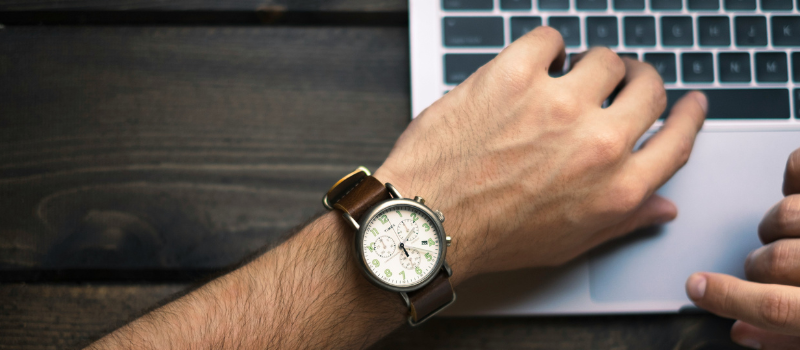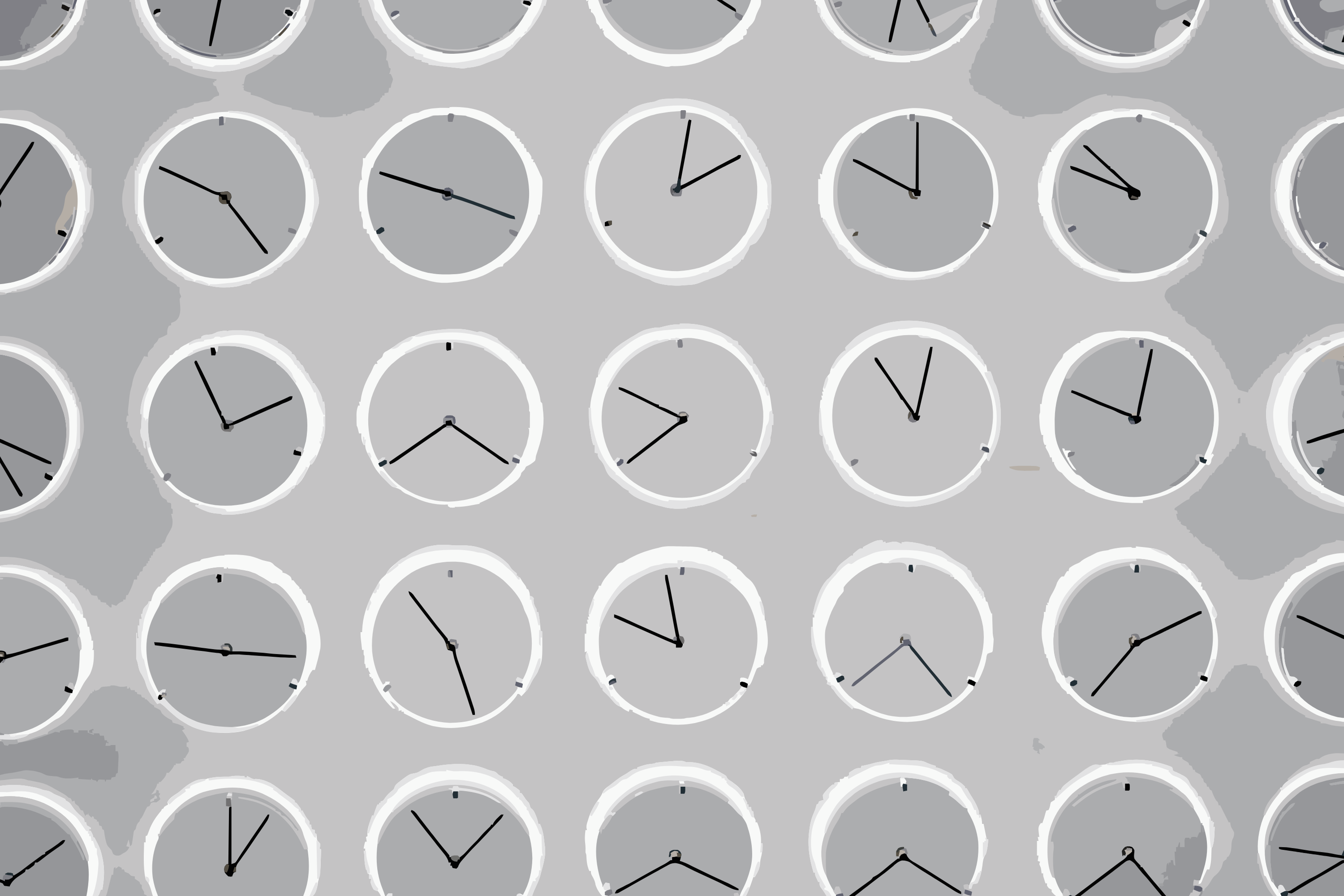Remember when summer vacation felt like an eternity? When December felt years away in September? When a single weekend contained approximately 47 hours of actual usable time?
Yeah, me neither.
Because somewhere between childhood and now, time decided to hit the fast-forward button and never looked back.
Now you blink and it's Tuesday. Blink again and it's somehow January. Look down at your phone for "just a second" and, whelp, three hours have evaporated into the digital void. Time isn't just passing anymore—it's sprinting past you.
This is chronophobia: the very real, very uncomfortable fear of time and its relentless, uncaring march into the future.
It's the anxiety that hits when you realize your kid is suddenly in high school, that reunion is for your 20-year anniversary (not your 10-year), and that next year plan you've been postponing for five years is becoming a running joke. It's the creeping dread that you're running out of time to do everything you wanted to do, be everything you wanted to be, and somehow also remember to buy paper towels.
If you've ever looked at a calendar and felt genuine panic, you're not alone. And no, you're not just bad at time management. You might be experiencing a legitimate psychological phenomenon that affects way more people than you'd think.
Below, let’s talk about why time terrifies you and what you can actually do about it besides just panicking quietly.
What Is Chronophobia?

Chronophobia is the extreme, persistent fear of time passing or the inability to track time's passage. The term comes from the Greek words "chronos" (time) and "phobos" (fear).
This is anxiety that becomes severe enough to impact your relationships, career, and daily functioning. We're talking legitimate panic attacks when you think about aging, obsessive clock-watching, avoiding birthday celebrations, and genuine distress about the future.
It's categorized as a specific phobia: an anxiety disorder characterized by intense, persistent fear of something that poses little actual danger but still triggers avoidance and anxiety.
Now, before you start diagnosing yourself during this article (don't do that), it's important to distinguish between normal time anxiety and chronophobia. Most of us experience some level of existential dread. That's human. Perfectly normal.
Chronophobia becomes a problem when your preoccupation with time's passage seriously impairs your everyday life.
Noticing that your vacation flew by? Normal. Refusing to go on vacation because you can't handle watching time disappear? That's chronophobia.
The Spectrum of Time Anxiety
Time anxiety exists on a spectrum from"mild Sunday scaries to full-blown psychological crisis:
- Mild: Occasionally feeling like time is moving too fast, especially during good experiences. Wishing weekends were longer. Generally manageable existential dread about aging.
- Moderate: Frequently avoiding milestone events because they remind you of time passing. Difficulty making future plans because thinking about time causes anxiety. Regular distress about aging or wasted time.
- Severe (Chronophobia): Obsessive behaviors around tracking time, panic attacks when contemplating the future, social isolation due to time-related fears, and inability to function normally due to overwhelming anxiety about time's passage.
Most of us live somewhere in the mild-to-moderate zone. But if you’re on the more extreme spectrum, you’re going to be okay. Talk to a doctor. They can definitely help.
Who Gets Chronophobia (And Why)?

About 10% of adults will experience a specific phobia at some point in their lives, though the exact numbers for chronophobia specifically are fuzzy because, well, people don't exactly rush to report it to their doctors.
But certain groups are significantly more vulnerable:
People in Prison
Inmates, especially those serving long sentences, are particularly prone to chronophobia—sometimes called "prison neurosis." They become fixated on the passage of time, counting down days until release while simultaneously feeling like time is moving either impossibly slowly or terrifyingly fast.
When you're trapped in an unchanging environment with nothing but time, your relationship with it gets weird. Really weird.
The Elderly and Terminally Ill
People facing their own mortality (whether due to age or terminal illness) often develop intense anxiety about time running out. They may become fixated on counting the days they have left, which only amplifies the fear.
When time starts feeling finite in a very real way, chronophobia can develop as your brain tries (unsuccessfully) to cope with that reality.
Trauma Survivors
People who've experienced severe trauma, particularly disasters or life-threatening situations, are more likely to develop chronophobia. This can manifest as part of PTSD, where the sense of a foreshortened future becomes overwhelming.
When something disrupts your sense of safety and predictability, your relationship with time often gets collateral damage.
People During Major Life Transitions
During significant life transitions—retirement, empty nest, career changes, the pandemic—people often experience heightened time anxiety as familiar routines disappear and time becomes harder to track.
Remember those pandemic years when every day felt identical and time became a meaningless soup? Yeah, that triggered chronophobia in a lot of people who'd never experienced it before.
Anyone With Pre-Existing Anxiety
If you already have generalized anxiety disorder, panic disorder, depression, or other mental health conditions, you're at higher risk for developing chronophobia.
Your brain is already primed for anxiety. Time just becomes another thing for it to obsess over.
How Chronophobia Actually Shows Up (the Symptoms)

Chronophobia doesn't just mean you hate Mondays or wish your vacation lasted longer (that’s all of us). It manifests in specific, identifiable ways that genuinely disrupt your life:
- Physical panic responses: Rapid heartbeat, sweating, difficulty breathing, nausea, trembling, chest tightness. Your body literally responds to thinking about time the same way it responds to actual danger.
- Psychological disorientation: Time feels sped up or slowed down, overwhelming dread about time passing, awareness the fear is irrational but complete inability to control it. You know time isn't attacking you. Your brain doesn't care.
- Avoidance behaviors: Skipping milestone events, obsessive clock-watching, procrastination, inability to make future plans, constantly seeking distractions, poor time management despite (or because of) obsession with time.
- Circular thought patterns: "I'm wasting time thinking about wasting time which is wasting more time oh god I'm wasting so much time." Your brain gets stuck in exhausting loops about time running out, difficulty concentrating, obsessive thoughts about aging and mortality.
It's exhausting. Trust me, I get it.
Why Your Brain Does This to You
Your brain isn't trying to ruin your life (even though it often feels that way). Chronophobia is essentially a state of near-constant anxiety, and anxiety is always about the future.
Here's what's happening:
- Your brain evolved to worry about immediate threats. Predators, starvation, getting kicked out of the tribe. These were problems with solutions: run, eat, apologize. Time passing? Not a solvable problem. Your brain still tries to treat it like one, though, which creates this endless anxiety loop.
- Modern life amplifies time pressure. Deadlines, milestones, productivity culture, social media showing you everyone else's highlight reel of accomplishments. Your brain is constantly being told "time is running out and you're behind."
- You're losing natural time markers. When life becomes routine and predictable, you lose the novel experiences that help your brain track time. Everything blends together, which makes time feel like it's accelerating.
- Your brain conflates time with mortality. Time passing means you're getting older, which means you're getting closer to death, which triggers every survival instinct your brain possesses. Fun times.
Chronophobia robs you of the ability to live in the present. When you're always preoccupied with time passing, you can't experience joy, stay focused, or feel grounded.
So you end up in this cruel paradox: worrying about wasting time prevents you from actually using time well, which gives you more to worry about, which makes you waste more time worrying.
How to Deal With Chronophobia

Good news: chronophobia is treatable.
Bad news: it requires actual work, not just reading an article and hoping the anxiety magically disappears.
Though honestly, if reading this article fixed everything, I'd be insufferably proud of myself.
1. Professional Treatment Options
Cognitive Behavioral Therapy (CBT) is the frontline treatment for chronophobia and shows the highest success rates.
CBT helps you identify the catastrophic thoughts driving your anxiety ("I'll never accomplish what I want in life") and replace them with more realistic ones ("I can still work toward meaningful goals").
Exposure therapy involves gradually confronting time-related situations in order from least to most anxiety-producing until they become tolerable. Since you can't exactly avoid time itself, this means exposing yourself to things that trigger your time anxiety: calendars, milestone events, planning for the future.
For severe cases, medication like SSRIs or benzodiazepines may be prescribed alongside therapy to manage anxiety symptoms.
This isn't weakness. This is using the tools available to fix a legitimate problem. Your brain chemistry isn't a moral failing.
2. Immediate Coping Strategies
While professional help addresses the root causes, these strategies can help manage acute time anxiety:
Grounding techniques and body-oriented practices can provide short-term relief. When time anxiety hits, try:
- The 5-4-3-2-1 technique: Name 5 things you can see, 4 you can touch, 3 you can hear, 2 you can smell, 1 you can taste. Forces your brain into the present moment instead of spiraling about the future.
- Focused breathing exercises: Your parasympathetic nervous system can override your panic response. Breathe in for 4 counts, hold for 4, out for 6. Attention to breathing rhythm has a relaxing effect and can decrease chronophobia-related anxiety.
- Mindfulness meditation: Mindfulness techniques reduce anxiety about passing time by refocusing attention on the present moment. Yes, I know "be present" sounds like fortune cookie advice, but the research actually backs this up.
3. Practical Life Changes
Beyond therapy and coping techniques, you can restructure your relationship with time:
- Create meaningful time markers. Novel experiences help your brain track time more effectively and prevent everything from blending together. Break up routine with new activities, even small ones. Try a different coffee shop. Take a different route home. Your brain needs variation to register time passing normally.
- Focus on meaning, not productivity. Instead of obsessing over accomplishing everything, ask yourself what's actually meaningful about how you spend time. Older people get really good at focusing on meaningful parts of life rather than trying to do everything.
Your 90-year-old self doesn't care how many emails you sent. She cares about the relationships you built, the experiences you had, and whether you generally enjoyed being alive. Act accordingly.
- Limit time-tracking obsession. If you find yourself constantly checking clocks, set specific times to check the time. Sounds silly, but it breaks the compulsive loop.
- Schedule "time anxiety" worry periods. Instead of letting time anxiety interrupt your entire day, schedule 15 minutes to worry about it. When anxious thoughts pop up outside that window, remind yourself "I'll worry about this at 3 PM." This contains the anxiety instead of letting it dominate everything.
- Build structure without rigidity. Some routine helps your brain feel grounded, but too much routine makes time disappear. Find the balance that works for you.
The Uncomfortable Truth About Time
Time is passing. Every moment. Right now, as you read this. And there's literally nothing you can do about it.
I know. It's not comforting. But accepting this reality is actually the first step toward dealing with chronophobia.
You cannot stop time. You cannot slow it down. You cannot pause it, rewind it, or negotiate with it. Time is the one truly non-negotiable aspect of existence, which is exactly why it terrifies us so much.
Still…anxiety about time robs you of experiencing the present. The time you spend worrying about time passing is time you're not actually living.
Every minute spent in time-related panic is a minute you didn't get to experience whatever's happening right now.
The goal isn't to stop caring about time or to magically become zen about mortality. The goal is to develop a functional relationship with time where you can acknowledge its passage without letting that acknowledgment completely hijack your brain.
Make Peace With the Clock
Time is going to keep passing whether you worry about it or not. The question isn't whether time moves forward—it's whether you're going to spend that time in constant panic or actually living.
Chronophobia is real, it's valid, and it's absolutely treatable. You don't have to live in perpetual anxiety about the calendar. You can build a relationship with time that doesn't involve daily existential dread.
Start by just noticing when time anxiety hits. Don't judge it, don't fight it, just observe it.
"Huh, I'm feeling anxious about time passing right now."
That awareness alone is the first step toward changing your response.
Your future self (who exists in future time that will inevitably arrive) will thank you for starting now.
Subscribe to Hold That Thought for more strategies to manage your brain when it's being dramatic about perfectly normal aspects of existence.
.png)

.png)
